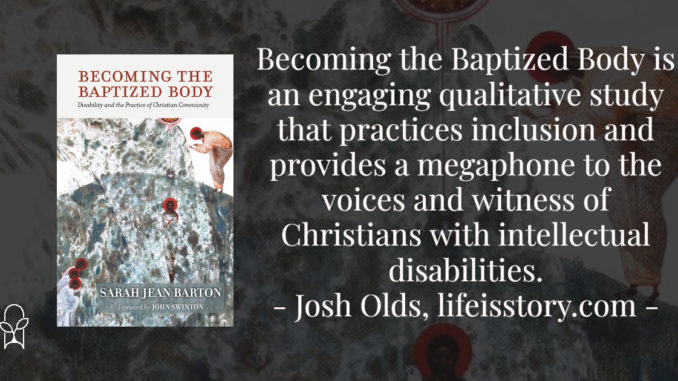
Published by Baylor University Press on August 1, 2022
Genres: Academic, Disability Theology, Non-Fiction
Buy on Amazon
Goodreads

In Becoming the Baptized Body Sarah Jean Barton explores how baptismal theologies and practices shape Christian imagination, identity, and community. Privileging perspectives informed by disability experience through theological qualitative research, Becoming the Baptized Body demonstrates how theology done together can expansively enliven imagination around baptismal practices and how they intersect with the human experience of disability. Through a lively tapestry of stories, theological insights, and partnerships with Christians who experience intellectual disability, Barton resists theological abstraction and engages and expands the field of disability theology.
Christian denominations vary widely about whom they will baptize and under what conditions they will baptize them. (Also in who can perform baptisms, how they should be performed, when they should be performed, the significance of baptism…the list is nearly endless.) In my own faith tradition, the confession of faith was seen as integral to the baptismal experience. If you confess with your mouth, “Jesus is Lord,” and believe in your heart that God raised Him from the dead, you will be saved. – Romans 10:9. Another element was intellectual assent. Faith leaders in my tradition wanted to be assured that the person being baptized understood what they were confessing. As such, the church only very rarely baptized anyone under the age of 12.
But all of this gatekeeping—while perhaps well-intentioned and beneficial in some circumstances—raises some pretty significant questions. Can those who are nonverbal “confess with their mouth”? Can those with intellectual disabilities meet the criteria for baptism that some church denominations have set? In Becoming the Baptized Body, Sarah Jean Barton talks to intellectually disabled individuals, caregivers, and clergy to show how certain baptismal practices can exclude people from the community.
Becoming the Baptized Body is a qualitative research study, much like you might see in a doctoral dissertation or some other type of formal research. That’s worth noting because it brings a sense of gravity to the work. This isn’t something that has been undertaken haphazardly or informally. Barton’s methodology is robust and a good portion of the book is spent detailing her methodological considerations, including ethical concerns, participant demographics, and so on. Often, in studies, we get the end result without the infrastructure that led to the result. Becoming the Baptized Body tells the full story from beginning to end, presenting the data in unbiased terms and ensuring that the participants’ stories are told correctly while yet protecting their identities. For some, it’ll mean that the book is a bit drier and slower-paced, but for those of us who engage in research like this, these sections showcase Barton’s care and concern for her topic and validate her results.
My lone criticism is that I would have liked to have heard more from the perspective of the research participants. Obviously, in any qualitative study, a large amount of data curation must be done and I’m not suggesting that Becoming the Baptized Body is lacking in sharing the voices of its participants. Rather, those perspectives are so needed that I would have gladly spent more time in those comments even if it meant sacrificing some of Barton’s robust review of the literature.
While Barton focuses on the act of baptism, it’s worth noting that baptism is also a symbol for entrance into the Kingdom of God and, in a lesser (but more practical) sense, entrance into the Christian community of the church. Thus, exclusion from baptism is in many ways exclusion from the church body. The solution to the problem in Becoming the Baptized Body is not to just amend our baptismal theology or practices, but to do so as part of creating an inclusive community where individuals with disabled are welcomed as equals in the community of discipleship.
Barton reminds us that symbols matter, and perhaps no symbol matters more than the sacrament of baptism. By creating barriers to baptism, we often believe we are “taking baptism seriously.” In truth, taking baptism seriously means tearing down barriers and offering pathways to equality and inclusion. Academic and erudite yet compulsively readable, Becoming the Baptized Body is an engaging qualitative study that practices inclusion and provides a megaphone to the voices and witness of Christians with intellectual disabilities.
